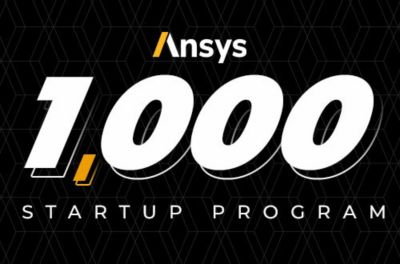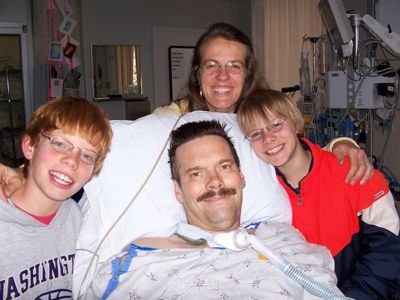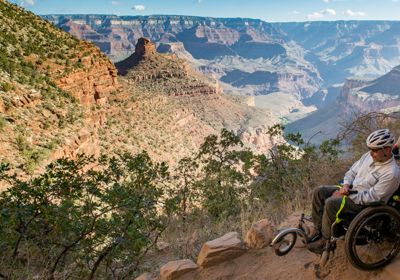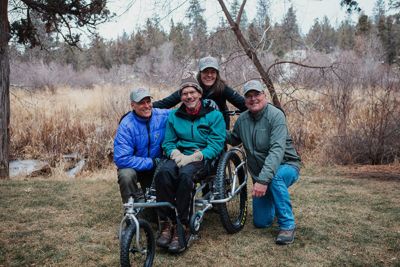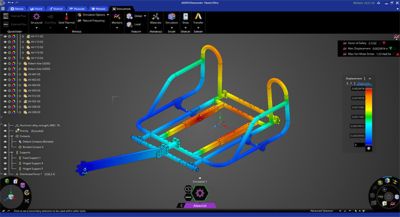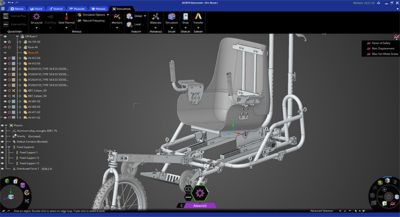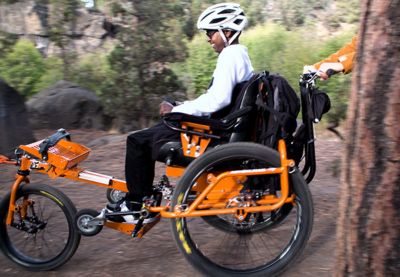-
United States -
United Kingdom -
India -
France -
Deutschland -
Italia -
日本 -
대한민국 -
中国 -
台灣
-
-
產品系列
查看所有產品Ansys致力於為當今的學生打下成功的基礎,通過向學生提供免費的模擬工程軟體。
-
Ansys Blog
December 7, 2020
AdvenChair Rolls Boldly Into Adventure With Off-Road Wheelchair Design
Geoff Babb is an outdoor adventurer. He has enjoyed mountain biking, skiing and hiking in rugged terrain with friends over the years. He wasn’t about to let a stroke in 2005 stop him from enjoying his passions, or even a second stroke 12 years later. By then he was the founder of a company called The Onward Project, maker of the AdvenChair, dedicated to inspiring and enabling those with mobility challenges to visit wild places. The company’s motto: Roll Boldly.
Geoff Babb, inventor of the AdvenChair, and
family after his first brain-stem stroke
You can see Geoff doing just that in a YouTube video featuring him in a prototype of the AdvenChair in the woods, on the beach and in the snow, accompanied by a group of friends who push and pull the AdvenChair using a set of handlebars in back and ropes in front.
“We’re sometimes asked about an electric-assist version, but honestly we're not really thinking about it at this stage, primarily because we see the group dynamics of teamwork as a key tenet of the AdvenChair,” Babb says. "AdvenChairing is a team sport.”
On the Road to an Off-Road Wheelchair Design
When the idea of hiking in a wheelchair came to him in 2006, it quickly became apparent that the standard wheelchair, designed for floors in buildings and paved roads outside, was not up to the challenge of more rugged surfaces.
“I wanted to make a chair that would benefit not only me but so many people who want to be outside,” Geoff says. “We tinkered with a standard wheelchair but that didn't work.” The stresses and strains on the chair would be too great, and the jolts experienced by the rider too jarring.
The AdvenChair 1.0 early prototype at the Grand Canyon.
Photo credit: Pat Addabbo
So Geoff turned to his mountain biking experience and began developing ideas for what would become the AdvenChair. It would be a three-wheeler — two large wheels in back for strength and stability and a smaller wheel out front for balance and maneuverability. It would incorporate the materials and components of a mountain bike that suit the terrain, including inner tire suspension, disc brakes and a lightweight but strong frame.
In 2017 Jack Arnold, an engineer with experience in product development, sheet metal and machinery, joined Geoff’s group. Together they decided it was time to scrap the early designs and build something new from the ground up.
Engineering a New Wheelchair Design
Jack brought an engineer’s knowledge of simulation to the group. Before the first design review meeting, he used an engineering software package to simulate the stresses and strains on a prototype design that could hold a 250-pound rider with a safety factor of 3, for a total load of 750 pounds. He knew they wouldn’t end up building this design, but he wanted to get the ideas flowing, and to let the team know that this was going to be an iterative process.
Left to Right: Dale Neubauer, Geoff and Yvonne Babb and Jack Arnold
“I wanted to go into the meeting with the ‘warm and fuzzy’ feeling of knowing that the structure was sound from the start,” Jack says. “You really need to use simulation upfront so you know that your first prototype is at least in the ballpark.”
A fortunate series of events brought Ansys simulations into the picture. In 2018, a reporter at a local radio station did a story on Geoff and the AdvenChair team. “After that story aired, we had a number of people reach out to us to provide service, and Ansys was one of them,” Geoff says. “Next thing I knew Ansys was offering to help us with the analysis. I asked Jack what he thought and he said we definitely should follow up on that.”
A structural analysis of the AdvenChair frame in Ansys Discovery
Soon Jack was working with Ansys Discovery as part of the Ansys Startup Program to verify the frame simulation he had done with the other software package. He ran several different simulations with the seat in different positions and with different loadings to see how these changes affected the frame.
“I quickly learned that it was so much easier to make design tweaks in Discovery in Explore mode and get a solution almost instantly to see that you are trending in the right direction,” Jack says. “I really love the brilliant use of onboard memory on video cards to make nearly instant updates possible.”
The Advenchair is equipped with various adjustment mechanisms
to accommodate riders of varying sizes and weights.
But what he loves the most about Discovery is the generative design feature. “Watching it iterate, removing material in the unstressed areas and then suggesting a final shape —that is really cool,” Jack says. “Our current AdvenChair is heavier than our design goal, so we are going to use generative design to eliminate material where it’s not needed. That will reduce the weight and translate into material and cost savings as well.”
Heading to Market
Somewhere along the way the team came up with what Geoff calls the “Swiss Army Knife” approach. This meant adding adjustability and scalability to the AdvenChair, so it could be used throughout a person’s lifetime for various purposes. An important feature of this approach is that the front wheel is removable so the AdvenChair can be used as a standard wheelchair to go into buildings, fit under tables and allow transfers in and out of vehicles.
Much of what Jack and the design team have been doing these last two years has been working on the adjustability of components. They want the rider to be able to adjust the seat position fore and aft, to adjust the inclination angle of the seat, and to set the footrest in the most comfortable position. Moving these components around in Discovery and seeing how they change the loads on the chair and its performance was easy.
Isaac Shannon takes to the trails, thanks to AdvenChair.
“With Discovery, we've designed a scalable platform that can handle anyone from a small child to an adult,” Jack says. “This includes three different seat bucket sizes that can be swapped out when needed. The idea is that a family can buy this for a child and it can be a lifetime chair for them.”
In the bigger scheme of things, Geoff sees the AdvenChair as a way of helping people of all ages with different abilities enjoy the outdoors again.
“We want to reach out to veterans to get their buddies out on the trail using teamwork,” he says. “Children with cerebral palsy. Elderly folks who just can't easily hike anymore and people with Parkinson's disease who want to visit their favorite lake again.” He talks about how he received a call from a man a few weeks ago whose daughter was in hospice and wanted to revisit her favorite spots on the family farm one last time. He loaned them an AdvenChair and she got her wish, a week before she passed.
In this way and many others, the AdvenChair team is already fulfilling its dream of helping people who love the wild outdoors to hit the trails throughout their lifetimes, no matter what challenges life throws at them. They are currently taking orders until Feb. 15, 2021 for the first production run of AdvenChairs, with plans to ship their first 10 units in the second quarter of 2021. In the meantime, they are continuing to use Ansys Discovery to reduce the overall weight of the AdvenChair, particularly in the seat, and are developing a lighter-duty, less expensive urban version, for those who find the city wild enough.
Download a free trial of Discovery to see how it can accelerate your design process.











